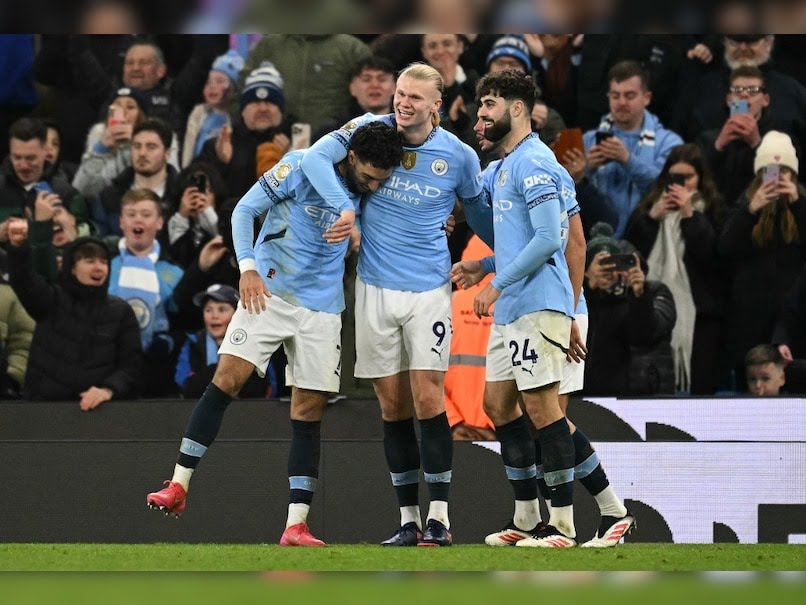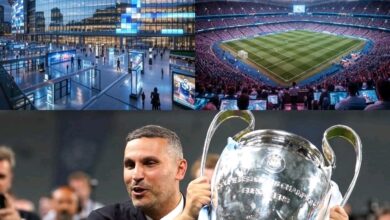Manchester City boss Pep Guardiola believes his team only have a “one per cent” chance of overcoming Real Madrid in their Champions League clash on Wednesday.

Pep Guardiola, the highly respected and often praised manager of Manchester City, has never been one to shy away from speaking his mind, especially when it comes to assessing the state of his team. As a manager with immense tactical knowledge and a deep understanding of football, Guardiola’s words always carry weight in the world of sports journalism. This time, however, his remarks regarding Manchester City’s chances of overcoming the challenge of Real Madrid in the UEFA Champions League caused some stir. Guardiola admitted that, despite his team’s commitment and determination, the chances of Manchester City progressing past the mighty Real Madrid were a mere one percent.
This candid assessment came in the wake of City’s narrow 3-2 defeat in the first leg of the Champions League knockout clash at the Etihad Stadium. With City leading 2-1 with only minutes remaining, a late and dramatic turnaround from Madrid snatched victory from the jaws of defeat, leaving Manchester City with a daunting task to face in the return leg at the Santiago Bernabeu. Guardiola’s response to the result was blunt and revealing, offering insight into both his tactical mind and his understanding of the uphill battle that lay ahead.
It is clear that Guardiola was not attempting to downplay the immense challenge City faces. Real Madrid, with their rich history in European competitions, particularly in the Champions League, have been one of the most successful clubs in the history of the tournament. The task of overcoming them, especially at their home ground in Madrid, was always going to be a formidable one. City, on the other hand, while being one of the most talented teams in Europe, have often struggled in their pursuit of the Champions League, despite their domestic dominance in England. Guardiola himself has tasted the highs and lows of European football, and his words reflect the deep understanding of the challenges posed by teams of Real Madrid’s caliber.
Guardiola’s one percent statement was not an exaggeration but rather a realistic appraisal of the situation. His acknowledgment that the chances of overturning the deficit were minimal was a sign of his honest and pragmatic approach to the challenge. His team, despite playing some of the best football in Europe over recent seasons, had struggled to show consistency in the Champions League, and that inconsistency was still very much a part of the conversation heading into the second leg against Madrid. Guardiola’s honesty, however, did not mean that he had written off his team’s chances entirely. In his typical style, Guardiola emphasized that even with such slim chances, Manchester City would continue to fight and give their best effort. That, after all, is the essence of football – no matter how slim the odds, the game is never over until the final whistle is blown.
The situation Manchester City found themselves in after the first leg of the knockout clash was a tough one. The team had managed to go ahead with a 2-1 lead, and for a brief period, it seemed like they might be able to hold on for the win. However, a series of events, which included some poor defending and an eventual late surge from Real Madrid, meant that City left the field with a narrow defeat, despite having been in a favorable position just minutes before. The late goals from Madrid stunned the City players, and Guardiola’s frustration was evident as he spoke about the final moments of the match. It was clear that he felt the result was a missed opportunity, as the team had been so close to taking a significant advantage into the second leg. In football, moments like these can define a season, and Guardiola, who is no stranger to high-pressure situations, understood the magnitude of the challenge ahead.
Guardiola’s comments about the slim chances of Manchester City advancing were not just based on the result of the first leg but also on the broader context of the team’s form throughout the season. Despite Manchester City’s dominance in the Premier League and their impressive performances in domestic competitions, their form in the Champions League had been inconsistent. Guardiola admitted that the team’s performances had not been at their best this season, and that was a reality that could not be ignored. City had, at times, struggled to find the same rhythm that had made them one of the most feared teams in Europe over recent years. Guardiola was upfront about this fact, acknowledging that his team’s performances and results this season had been far below the level that was expected of a club of Manchester City’s stature. This frank admission reflected Guardiola’s high standards and his unwavering belief in the potential of his team.
Despite the disappointing performances in Europe, Manchester City had shown glimpses of their true potential, particularly in the Premier League. A dominant 4-0 victory over Newcastle in the domestic league just before the Champions League clash with Real Madrid was a timely reminder of the team’s capabilities. The victory was a morale booster for Guardiola’s men, giving them some confidence as they traveled to Madrid for the decisive second leg. However, Guardiola was careful not to let that win cloud the bigger picture. He emphasized that, while the victory was important and gave the team some positive momentum, it did not change the fact that City had been far from their best in recent times.
Guardiola’s cautious approach was not meant to undermine his team’s abilities, but rather to provide a realistic assessment of the situation. It is easy for players, coaches, and fans alike to get caught up in the emotions of a big win, but Guardiola remained focused on the bigger picture. The reality, as he put it, was that City had been poor in terms of performances and results throughout the season. His words were a reminder that, despite the occasional flashes of brilliance, consistency at the highest level was what ultimately determined success in the Champions League.
Heading into the second leg in Madrid, Guardiola was not about to let his team lose sight of the task at hand. He acknowledged the size of the challenge but also made it clear that Manchester City would not back down easily. Guardiola’s belief in his team’s resilience and determination was evident. Despite the long odds and the pressure of facing one of the most successful teams in European football, he insisted that City would approach the game with the same mentality and determination that had defined their previous successes. His words were a message to his players: the job was not done yet, and there was still a chance, however small, to make something extraordinary happen.
For Manchester City, this tie was about more than just a single match. It was about proving to themselves and the world that they belonged among Europe’s elite. City had long been considered one of the best teams in the Premier League, but the Champions League had always eluded them. Guardiola, who had come to Manchester with the aim of leading City to European glory, knew that this was the moment to make his mark in Europe once again. The tie against Real Madrid, with its high stakes and immense pressure, was the kind of challenge that any top manager would relish. Guardiola, however, understood the fine line between success and failure, and he was realistic about the challenge facing his team.
In the aftermath of the first leg, Manchester City had little time to dwell on their disappointment. The second leg was fast approaching, and Guardiola’s focus shifted immediately to preparing his players for the daunting task ahead. The atmosphere at the Santiago Bernabeu would be electric, and the pressure would be immense. But Guardiola remained steadfast in his belief that his team could still perform at the highest level, even if the chances of advancing were slim. Football, as he knew all too well, can be unpredictable, and anything could happen on the night.
As the days ticked down to the second leg, Guardiola continued to prepare his players mentally and physically for the challenge. He knew that the key to success in Madrid would be a solid defensive performance, discipline, and taking every opportunity that came their way. The manager’s tactical acumen would play a pivotal role, as he looked to outwit Real Madrid’s formidable squad, led by the experienced and brilliant Carlo Ancelotti. Guardiola’s task was not just to motivate his players but also to set up a strategy that would give them a chance, however small, to overcome the odds and secure a place in the next round of the Champions League.
Guardiola’s message to his players was clear: despite the slim odds, they were not going to give up without a fight. The one percent chance that Guardiola spoke of was still a chance, and that was enough for him to push his team to give everything they had. It was in these moments, when the odds were stacked against them, that Manchester City could show the world their true character and resilience. Guardiola’s belief in his team was unwavering, and it was this belief that would fuel their efforts in Madrid.
In the end, football is a game of moments, and Guardiola’s words served as a reminder that, no matter the odds, anything is possible. While the one percent chance might have been a reflection of the tough task ahead, it was also a reflection of the fighting spirit that Guardiola instilled in his team. City would travel to Madrid with nothing to lose, but everything to gain. The journey was far from over, and Guardiola, as always, would give his team the belief and motivation they needed to face the challenge head-on.















